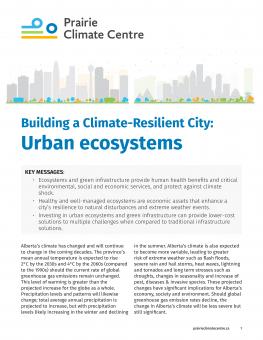
Building a Climate-Resilient City: Urban ecosystems
This policy brief focuses on measures related to urban ecosystems that cities can take to build their resilience to climate change.
This policy brief focuses on measures related to urban ecosystems that cities can take to build their resilience to climate change.
It focuses on enhancing and using urban ecosystems to reduce exposure to natural hazards and enhance adaptive capacity in a changing climate, underpinning the qualities of a resilient city. It further explores the vast additional bene ts that are gained from using the multiple functions performed by urban ecosystems.
Key Messages
- Ecosystems and green infrastructure provide human health benefits and critical environmental, social and economic services, and protect against climate shock.
- Healthy and well-managed ecosystems are economic assets that enhance a city’s resilience to natural disturbances and extreme weather events.
- Investing in urban ecosystems and green infrastructure can provide lower-cost solutions to multiple challenges when compared to traditional infrastructure solutions.
The Building a Climate-Resilient City series was prepared for the City of Edmonton and the City of Calgary by the International Institute for Sustainable Development and the University of Winnipeg. This series looks makes recommendations for steps that cities can take as part of their municipal adaptation planning to build their resilience to climate change. It explores three key principles of resilience building: robustness (strong design), redundancy (building extra capacity into systems to act as fail-safe networks) and resourcefulness (citizen empowerment).
Participating experts
You might also be interested in
Building a Climate-Resilient City: Transportation infrastructure
This policy brief examines ways of building resilient urban transportation infrastructure to reduce exposure to natural hazards, decrease potential risks by implementing mitigation measures and enhance adaptive capacity in a changing climate.
Building a Climate-Resilient City: Economics and finance
This policy brief focuses on economic and financial measures to build cities' resilience to climate change.
Building a Climate-Resilient City: Agriculture and food security
This policy brief focuses on measures related to agriculture and food security that cities can take to build their resilience to climate change.
Building a Climate-Resilient City: Transformational adaptation
This policy brief focuses on how cities can build resilience to climate change through transformational adaptation.